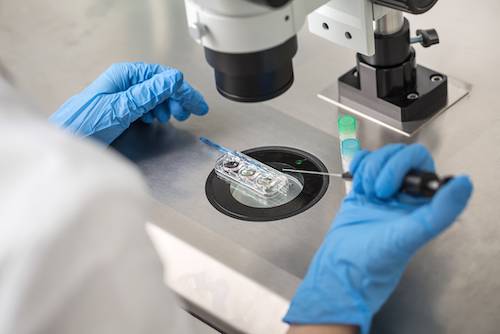Preimplantation Genetic Testing
Screening embryos for chromosomal abnormalities before selection and transfer to the uterus.
Preimplantation genetic testing (PGT is a lab procedure used in conjunction with in-vitro fertilization (IVF) and embryo biopsy to screen embryos for chromosomal abnormalities or to identify embryos that are affected or a carrier of a specific genetic disease. PGT-M (M for monogenic disease) is used to identify preimplantation embryos that are affected by or carriers of a specific single–gene defect, such as cystic fibrosis or sickle cell anemia. Many common genetic disorders can be identified on your and your partner’s carrier genetic screening panels (optional) that are performed several weeks before your IVF cycle. PGT-A (A for aneuploidy) is used to identify embryos with specific chromosomal abnormalities such as trisomy 21(also known as Down’s Syndrome). In other words, PGT-A can identify embryos with an incorrect number of chromosomes (aneuploidy). This is especially useful in women over 38 years of age as they are more susceptible to a process called non-disjunction and mishap repair that can lead to an increase in the percentage of chromosomally abnormal embryos. The transfer of an embryo reported as being chromosomally normal after PGT-A has been reported to decrease the risk of miscarriage, shorten the time to pregnancy, and improve pregnancy rates.
IVF with PGT-A may be recommended by your physician if you are over 38 years of age, have failed one or more IVF cycles, or have repeated miscarriages. IVF with PGT-M may be recommended by your physician if you or your partner have been identified to be a carrier of a genetic disease after your carrier-screening tests. after IVF.





